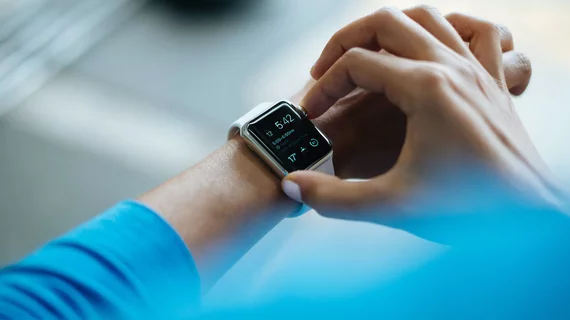KardiaBand outperforms Apple Watch in diagnosing AFib, but a cardiologist’s perspective is still crucial
The KardiaBand device from AliveCor is a more reliable tool for identifying atrial fibrillation (AFib) than the Apple Watch 4, according to a new head-to-head analysis published in JACC: Clinical Electrophysiology. [1]
While early wearable devices used photoplethysmography to detect irregular heart rhythms, the study’s authors explained, these newer offerings both use single-lead electrocardiograms (ECGs) to make their assessments, providing the user with automated updates on their smart phones.
“In the context of a lack of clinical validation of these devices, the aim of this study was to assess the validity of two Apple Watch-based automated AFib assessment algorithms as well as their utility for the detection of AFib in the outpatient setting in patients older than 65 years,” wrote lead author Christopher Ford, MD, a cardiologist with Monash University in Australia, and colleagues.
So how do the two solutions compare? The study focused on data from 125 patients with a mean age of 75 years old. All patients were treated at a single facility. Ford et al. obtained a 12-lead ECG from each patient; they then obtained separate single-lead ECGs using the KardiaBand device and Apple Watch 4. Data in both instances was transmitted to an Apple iPhone 8. Patients also answered a questionnaire about their attitudes related to wearable technology.
When two cardiologists reviewed the 12-lead ECG results, AFib was confirmed in 27 patients, atrial flutter was confirmed in four patients and sinus rhythm was confirmed in 94 patients.
Overall, the KardiaBand was associated with more accurate heart rhythm assessments (74% vs. 65%) than the Apple Watch 4. The KardiaBand also had a higher sensitivity (89% vs. 19%) and negative predictive value (97% vs. 82%) than the Apple solution.
By combining cardiologist assessments with the automated offerings, the team emphasized, overall accuracy increased to 91% for the KardiaBand and 87% for the Apple Watch 4. In addition, agreement between the KardiaBand device and cardiologists interpreting 12-lead ECGs was found to be “excellent” and agreement between the Apple Watch 4 and cardiologists was “fair.”
“The results of our study suggest that the current major limitation of smart watch technology use for rhythm determination is based on the devices’ automated rhythm detection algorithms, rather than the ECG acquisition technology; cardiologist rhythm assessment of both devices’ single-lead ECG tracings yielded high concordance compared with 12-lead ECG tracings,” the authors wrote.
The questionnaire answers, meanwhile, confirmed that 86% of patients would seek medical advice if a wearable device consistently identified “abnormal” findings.
“Although there is little doubt that devices such as these will become an important part of opportunistic diagnosis of AFib, further real-world validation studies of their accuracy are desperately needed before they can be recommended for widespread use in diagnosing AFib,” the authors concluded.
Additional context related to the KardiaBand and Apple Watch 4
AliveCor filed a federal antitrust lawsuit against Apple in May 2021. In that lawsuit, the company alleged that Apple saw the success of AliveCor’s FDA-cleared ECG offerings for the Apple Watch and then copied that technology.
A judge from the U.S. International Trade Commission recently ruled that Apple did, in fact, infringe on some of AliveCor’s patent rights. A final ruling is expected by October.
Also, as Long et al. noted in their analysis, AliveCor stopped marketing the KardiaBand once Apple developed its own ECG hardware. The company is, however, still selling other devices that communicate with smartphone apps.
The authors also pointed to the fact that the Apple Watch 4 is no longer Apple’s most recent smart watch, writing that “we do not believe that there is any difference in the ECG acquisition hardware or software compared with the Apple Watch 4.”
Related Apple Watch Content:
Judge says Apple violated ECG patents, making U.S. import ban of Apple Watches a possibility
Regulatory Roundup: FDA clears several new solutions, including Apple’s latest AFib offering
Cardiologs puts its AI model up against the Apple Watch—and wins
Reference:
1. Christopher Ford, Charis Xuan Xie, Ashlea Low, et al. Comparison of 2 Smart Watch Algorithms for Detection of Atrial Fibrillation and the Benefit of Clinician Interpretation: SMART WARS Study. J Am Coll Cardiol EP. 2022 Jun, 8 (6) 782–791.

